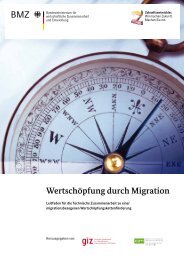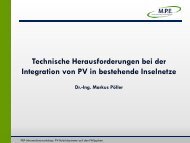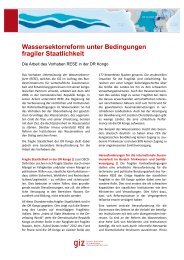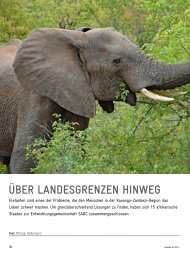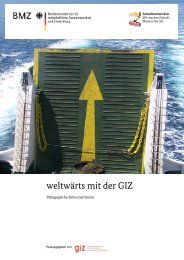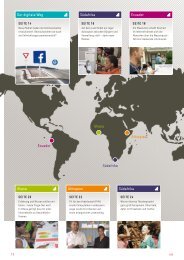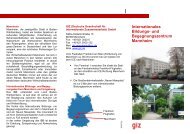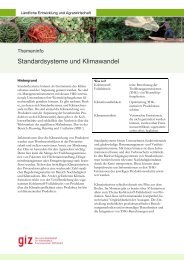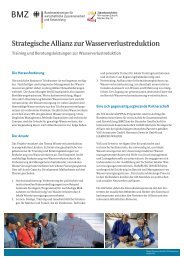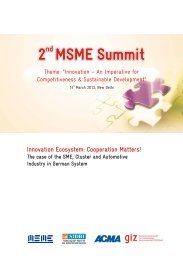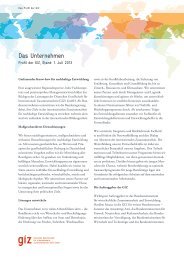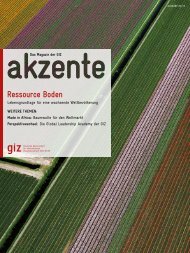Untitled - GIZ
Untitled - GIZ
Untitled - GIZ
You also want an ePaper? Increase the reach of your titles
YUMPU automatically turns print PDFs into web optimized ePapers that Google loves.
2<br />
Management Report 2011<br />
I. Operations and business<br />
environment<br />
a. The company<br />
As of 3 January 2011, the institutional merger of the German<br />
Development Service (DED), InWEnt – Capacity Building<br />
International, Germany, and the Deutsche Gesellschaft für<br />
Technische Zusammenarbeit (GTZ) GmbH was legally concluded<br />
and the company was renamed the Deutsche Gesellschaft für<br />
Internationale Zusammenarbeit (<strong>GIZ</strong>) GmbH. The three predecessor<br />
organisations had already been merged on 1 September<br />
2010. As a public-benefit federal enterprise, <strong>GIZ</strong> promotes<br />
international cooperation for sustainable development and<br />
international education work in line with its corporate purpose.<br />
It supports the German Federal Government in achieving its<br />
development-policy objectives.<br />
The registered offices of the company are in Bonn and Eschborn.<br />
<strong>GIZ</strong> implements projects in more than 130 countries and has<br />
over 17,000 staff worldwide. Some 70 % of its staff are employed<br />
as national personnel in countries where projects are located.<br />
There are also around 1,000 development advisors, almost 600<br />
integrated experts, and approximately 450 returning experts, 1<br />
as well as just under 500 » weltwärts « volunteers 2 who were placed<br />
or financed through <strong>GIZ</strong>.<br />
<strong>GIZ</strong> offers demand-driven, tailor-made, and effective services for<br />
sustainable development. The services of <strong>GIZ</strong> draw on a wealth<br />
of regional and technical expertise, presence in the field, and tried<br />
and tested management know-how. As a service enterprise, <strong>GIZ</strong><br />
helps to facilitate change and empowers people to take ownership<br />
of their own development processes. The company supports its<br />
partners at local, regional, national, and international levels in<br />
designing strategies and meeting their policy goals. In the international<br />
context, <strong>GIZ</strong> covers a unique spectrum of fields, including<br />
economic development and employment promotion, support for<br />
governance and democracy, promotion of peace, security, reconstruction,<br />
and civil conflict transformation, food security, health,<br />
basic education, environmental protection, resource conservation,<br />
and climate change mitigation and adaptation. It also supports its<br />
partners with management and logistical services, and emergency<br />
aid and refugee programmes. As a recognised development service<br />
provider, <strong>GIZ</strong> seconds development advisors to partner countries.<br />
It places integrated and returning experts and promotes networking<br />
and dialogue among international cooperation actors. Capacity<br />
development for partner-country experts is a major component<br />
of its services.<br />
Most of its work is commissioned by the German Federal Ministry<br />
for Economic Cooperation and Development (BMZ). <strong>GIZ</strong> also<br />
operates on behalf of other German ministries – including the<br />
Federal Foreign Office, the Federal Ministry for the Environment,<br />
Nature Conservation and Nuclear Safety, the Federal Ministry<br />
of Defence, the Federal Ministry of Economics and Technology,<br />
and the Federal Ministry of Education and Research – as well as<br />
German states and municipalities, and public and private clients<br />
in Germany and abroad. These include the governments of other<br />
countries, the European Commission, the United Nations, the<br />
World Bank, and private companies. <strong>GIZ</strong> works closely with<br />
the private sector and promotes synergies between international<br />
cooperation and foreign trade activities.<br />
b. Strategy<br />
The following national and international context as well as<br />
trends in international cooperation for sustainable development<br />
are crucial to the strategic orientation of the reorganised<br />
company:<br />
1 In its personnel placement programme, the Centre for International Migration and Development<br />
(CIM) recruits highly qualified experts and managers for local employers in partner<br />
countries. In the Integrated Experts Programme, German and European experts are recruited<br />
for assignments of up to six years. In the Returning Experts Programme, foreign experts are<br />
assisted in assuming positions important to development in their country of origin after studies,<br />
training, or employment in Germany.<br />
2 The BMZ-financed »weltwärts with <strong>GIZ</strong>« programme gives young people between 18 and<br />
23 the opportunity to volunteer in a <strong>GIZ</strong> partner organisation for 12 months.<br />
The dynamic economic growth of several emerging economies<br />
continues to realign economic and political power relations. Many<br />
donors, including Germany and the European Union (EU), are<br />
responding to these changes with a differentiated cooperation<br />
approach, in line with their development objectives. Especially





